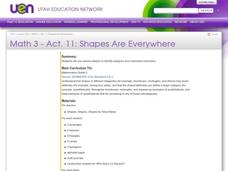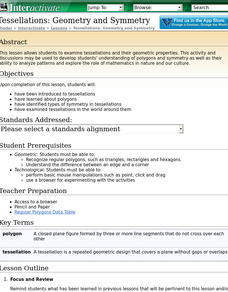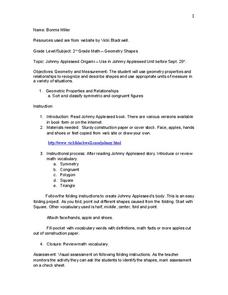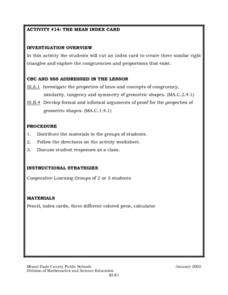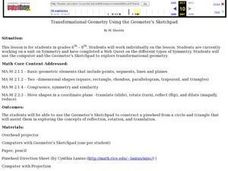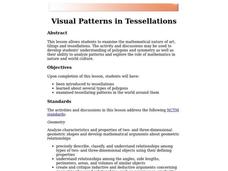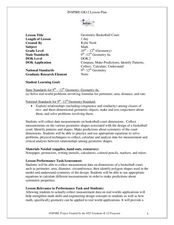Lane Community College
Review Sheets: Geometry
Full of problems with polygons, angles, lines, and triangles, your learners get a multi-page packet that provides all they need to know. It contains many of the standard problem types as well as some more challenging questions.
Curated OER
Shapes Are Everywhere
Third graders use various shapes to identify polygons and understand symmetry. They explore pattern blocks noticing their similarities and differences, then share with other team members. They draw 3 polygons in their journals and...
Houghton Mifflin Harcourt
Unit 5 Math Vocabulary Cards (Grade 6)
Acute angle, line of symmetry, and vertex are a few terms you'll find in a set of 90 flashcards designed to reinforce math vocabulary. Included in the set are two types of cards; a word card printed in bold font, and a...
Curated OER
Transformations Using the Geometer's Sketchpad
Students discover rules for single transformations, rules for composition of transformations, when a figure has transformation symmetry, and if a transformation is congruent to its preimage.
Curated OER
Geometry and Symmetry
Students examine tessellations and their geometric properties. The lesson and discussions may be used to develop students' understanding of polygons and symmetry as well as their ability to analyze patterns.
Curated OER
Classifying Transformations
Students analyze different polygons by shapes and sides. In this geometry activity, students differentiate between similar and congruent polygons. They name the different polygons based on the number of sides.
Curated OER
Governor's Garden
Young scholars review types of polygons and list several examples of each. They assume the role of a landscape artist interviewing for a job. They create sketches of their plans for six polygonal gardens and write an expository paragraph...
Curated OER
Math: Shapes and More Shapes
Students locate lines of symmetry in regular polygons and predict the number of lines of symmetry in an octagon. In three different polygons, they construct all lines of symmetry and after making their prediction about the octagon,...
Curated OER
Johnny Appleseed Origami
Second graders make an origami Johnny Appleseed. In this geometry lesson students follow folding instructions. They find different geometric shapes while they are folding. They create Johnny Appleseed's body and attach a face and hands...
Curated OER
Mirror Tool
Young scholars define properties of polygons. In this geometry lesson plan, students differentiate between similar and congruent polygons. They identify and use the properties of solids to solve problems.
Houghton Mifflin Harcourt
Unit 6 Math Vocabulary Cards (Grade 3)
A set of 49 math vocabulary cards ranges from angle to irregular polygon to parallel lines. Each sheet contains two cards: one with the word printed in bold text and the other with the definition.
Curated OER
Geometry in Tessellations
Students examine tessellations and their geometric properties. Students also develop a better understanding of lines, planes, angles, and polygons.
Curated OER
THE MEAN INDEX CARD
Middle schoolers cut an index card to create three similar right triangles and explore the congruencies and proportions that exist. They investigate the properties of lines and concepts of congruency, similarity, tangency and symmetry of...
Curated OER
Transformational Geometry Using the Geometer's Sketchpad
Students complete a webquest on the various types of symmetry. Using a computer, they explore the concepts of transformational geometry and identify points, segments, lines and planes. They experiment with the rotation of a quadrilateral...
Houghton Mifflin Harcourt
Unit 6 Math Vocabulary Cards (Grade 5)
Acute angles, nets, and vertices are only a few terms that a set of flash cards includes. Among the 108 cards, two types are available; word cards printed in bold-faced lettering, and corresponding definition cards equipped with an...
Curated OER
IGD: Perpendicular Bisector
Students draw perpendicular bisectors. In this perpendicular bisectors activity, students identify the perpendicular bisector in a polygon. They use web tools to create and measure perpendicular bisectors. Students...
CK-12 Foundation
CK-12 Middle School Math Concepts - Grade 6
Twelve chapters cover a multitude of math concepts found in the Common Core standards for sixth grade. Each title provides a brief explanation of what you will find inside the chapter—concepts from which you can click on and learn more...
Noyce Foundation
Lyle's Triangles
Try five problems on triangles. Levels A and B focus on shapes that can be created from right triangles. Level C touches upon the relationship between the area of a six-pointed star and the area of each triangle of which it is composed....
Curated OER
Quandaries, Quagmires, and Quadrilaterals
Students classify, flip, slide, and turn a quantity of quadrilaterals.
Curated OER
Visual Patterns in Tessellations
Students explore tessellations as well as various types of polygon. Students examine tessellating patterns in the world around them. Students examine tessellations by creating their own tessellations and completing the included worksheet.
Curated OER
Geometry in Tessellations
Students examine tessellations and their geometric properties. Students explore the concept of tessellations and lines, planes, angles, and polygons. Students experiment with the area and perimeter of polygons. Students analyze...
Curated OER
Geometric Basketball Court
Students calculate the area and perimeter of a basketball court. In this geometry lesson plan, students differentiate between similarity and congruence of geometric objects. They test conjectures and use it to solve problems.
Curated OER
Property Lists for Quadrilaterals
Students establish classifications of shapes by various properties (angles, sides, etc.). They introduce the important properties of common shapes. Students develop an awareness of the wide variety of ways the 2-D shapes can be alike.
Curated OER
Geometry: Tessellations
Learners create tessellations with computer software while applying their knowledge of reflections, rotations, and translations.



